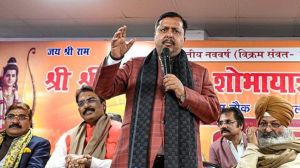PM packages Left 038; its CM
Politics acquired as much space as business did on the inaugural day of the CII partnership summit in Kolkata this morning. For Prime Minist...

Politics acquired as much space as business did on the inaugural day of the CII partnership summit in Kolkata this morning. For Prime Minister Manmohan Singh, it certainly made great business sense to showcase the West Bengal Chief Minister, Buddhadeb Bhattacharjee, as the best face of Left support to the UPA government before domestic as well as foreign industry.
Proudly proclaiming that he was not at all surprised when Azim Premji ranked Buddhadeb Bhattacharjee as the nation8217;s 8216;8216;Best Chief Minister,8217;8217; Singh said that the country needed more such visionary and courageous political leaders who understand the challenge of modernisation.
And the re-assurance to the industry, from what in effect constituted as a joint platform of the UPA and the Left, followed in the fitness of sequence as the Prime Minister said: 8216;8216;Our government is not only committed to providing an investment-friendly environment but also has the full support of our Left allies in doing so. We are committed to the National Common Minimum Programme to boost private investment and encourage FDI particularly in areas of infrastructure, high-technology and exports.8217;8217;
He then went beyond glowing personal tributes to the broader horizons of China as an example and to Karl Marx as a statesman to try and convince that there is indeed a 8216;8216;meeting of minds between Delhi and Kolkata.8217;8217; Because, Singh explained 8216;8216;the idea of Buddhadebji of growth with equity and social justice has captured the minds of people of India.8217;8217; Singh went on to quote Marx as having said: 8216;8216;When ideas capture the minds of men, they become a material force in society.8217;8217;
Earlier he observed that 8216;8216;if communist China can be the top investment destination in the world and if a Left government in West Bengal woos FDI agressively, I see no reason why the UPA government cannot make India an equally important FDI destination.8217;8217; As if in a public display of his assurance of India having been engaged more actively in the world economy with wide-ranging consensus from the Left, Singh announced from the podium the removal of restrictive provisions of Press Note 18 for all future joint ventures with foreign partners. The industry applauded the move. 8216;8216;The regulatory provision has been a source of discomfort,8217;8217; Singh acknowledged. For Buddhadeb Bhattacharjee, too, the inaugural day translated into one of the best possible private-government business partnerhips in recent times8212; West Bengal and Tata Steel signed up for a joint venture. The Tata company will invest to the tune of Rs 700 crore in Haldia in partnership with the West Bengal Industrial Development Corporation for setting up a merchant coke oven plant at Haldia.
Present during the signing ceremony, Ratan Tata said: 8216;8216;It is one more step in our realisation that we must enhance our engagement and investment in West Bengal. We believe in the leadrship of the state. It is a investment friendly state under the leadership of Buddhadeb Bhattacharjee,8217;8217; he added.
| nbsp; |
PMrsquo;S PROMISES
|
||||
| nbsp; |
8226; National Knowledge Commission to be set up to strengthen institutions and knowledge hubs |
nbsp; | |||
Bhattacharjee was visibly overwhelmed and said: 8216;8216;It is heartening to see that the Tatas have taken West Bengal on their map.8217;8217; The Chief Minister disclosed that more Tata ventures may be in the offing in sectors like auto, power and health care. 8216;8216;The Tatas have already promised to set up the biggest and most equipped cancer research center in West Bengal and we are trying to identify a suitable land for the purpose,8217;8217; said Bhattacharjee.
Earlier, in his inaugural address, Bhattacharjee once again reiterated his government8217;s commitment to change. 8216;8216;In the new economic order, it is not possible for anyone to remain isolated.8217;8217; At the same time, one must not overlook the need for a more equitable international economic order, he added.
- 01
- 02
- 03
- 04
- 05































